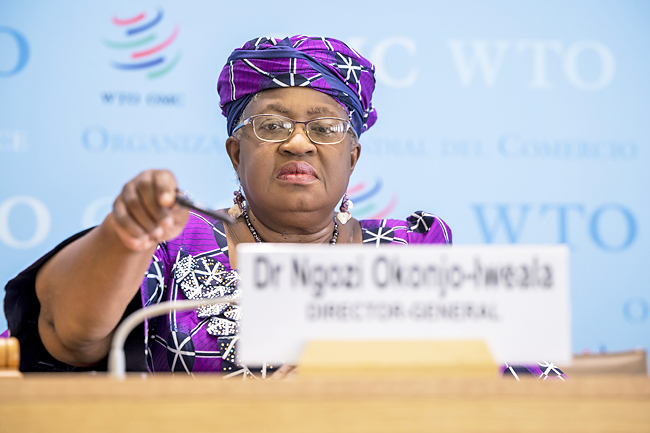GENEVA (AP) – The World Trade Organization (WTO) is predicting global trade volumes will grow a lackluster one per cent next year as crises and challenges weigh on markets, including high energy prices, and rising interest ratest amid the lingering COVID-19 pandemic.
The Geneva-based trade body said yesterday that the amount of goods shipped between countries are expected to rise 3.5 per cent this year, up from the three per cent that WTO anticipated in its first forecast for the year in April.
In 2023, the prediction is for such trade volumes to grow just one per cent, down from the 3.4 per cent expected previously.
“The risks are certainly to the downside” next year, WTO Director-General Ngozi Okonjo-Iweala told reporters at the group’s headquarters in Geneva.
This year, the higher predicted increase in trade volumes stems from better data that arrived in the middle of the year, contributing to a clearer forecast, and a boom in trade volumes from oil- and gas-producing countries in the Middle East as supplies from Russia were shunned and consuming countries sought alternative sources, WTO economists said.
The WTO laid out several factors weighing on trade, including higher energy prices resulting from Russia’s war in Ukraine, which prompted a number of countries – including European Union (EU) members that are big consumers of Russian oil and natural gas – to slap economic sanctions on Moscow.

“Today, the global economy faces a multipronged crisis,” Okonjo-Iweala said. “Monetary tightening is weighing on growth across much of the world, including in the United States (US). In Europe, high energy prices are squeezing households and businesses.
“Low-income developing countries in particular face serious risks from food insecurity and debt distress,” she added. While global trade has rebounded from a deep slump in the early days of the COVID-19 pandemic, US Federal Reserve and other central bank moves to choke off inflation through higher interest rates are likely to have knock-on effects for crucial spending in areas like housing, vehicle sales and bond prices, the WTO said.
The trade body said, however, that new information from purchasing managers on final goods prices and an index of input prices suggested that inflationary pressures “may have peaked” – a factor that could influence decision-making from central bankers in the months ahead.
WTO senior economist Coleman Nee said Russia hasn’t reported its trade figures to the global trade body since January, clouding the picture about how Russian trade was faring. The group said Confederation of Independent States countries – made up of most of the former Soviet states – saw exports drop nearly 10.5 per cent in the second quarter from the first three months of the year.
The WTO – just one of several multilateral organisations that predicts economic output fluctuations – said it expects global gross domestic product to increase by 2.8 per cent this year and 2.3 per cent next year, down from 3.2 per cent predicted in April. Rising food and energy costs have weighed on the global economy.
Food prices have jumped largely due to the impact of Russia’s war in Ukraine – the countries are big suppliers of grain – and that has weighed on many developing countries that have seen supplies of wheat and corn dry up as exports from the war-torn Black Sea region have slumped.
Natural gas prices in Europe also soared 350 per cent in August compared with a year earlier and were up 120 per cent over the same period in the US, the WTO said. Prices have since moderated.
“Most regions are set to register faintly positive export growth in 2023, with the exceptions of Africa and the Middle East, where export growth is projected to turn negative after growing strongly this year on the back of heightened demand for oil,” Okonjo-Iweala said.







